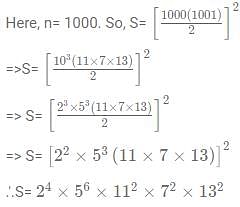CAT Exam > CAT Questions > The number of even factors of S, where S = 13...
Start Learning for Free
The number of even factors of S, where S = 13 + 23 + 33 +... 10003 is
Correct answer is '756'. Can you explain this answer?
| FREE This question is part of | Download PDF Attempt this Test |
Verified Answer
The number of even factors of S, where S = 13 + 23 + 33 +...10003isCor...
S = 13 + 23 + 33 +... 10003 is
We know that the sum of cubes of natural number starting from 1 upto n is given by: 


So, for even factors, we need at least one 2 among the four 2s available with S. We can select either one, two, three or four 2s. For the other prime factors, we also have the option to choose 0 out of the available number of 5s, 11s, 7s and 13s.
So, total even factors= 4×7×3×3×3 = 756.
Most Upvoted Answer
The number of even factors of S, where S = 13 + 23 + 33 +...10003isCor...
Question:
The number of even factors of S, where S = 13 * 23 * 33 * ... * 10003 is 756. Can you explain this answer in detail?
Solution:
To find the number of even factors of S, we need to consider the prime factorization of S and determine how many combinations of its factors can be formed to give an even number.
Prime factorization of S:
S = 13 * 23 * 33 * ... * 10003
To find the prime factorization of S, we need to analyze the given pattern. It is evident that the pattern is a sequence of numbers starting from 13 and increasing by 10 each time, until it reaches 10003.
Identifying the prime factors:
The numbers in the given pattern are all odd numbers, except for 10, which is even. Therefore, the prime factors of S are 2, 5, and all odd prime numbers up to 10003.
Counting the even factors:
To find the number of even factors of S, we need to consider the combinations of its prime factors that can be multiplied to give an even number.
Key Points:
- An even number can be obtained by multiplying any number of 2s with any combination of odd prime numbers.
- The number of combinations of odd prime numbers can be calculated using the formula (n1 + 1)(n2 + 1)(n3 + 1)..., where n1, n2, n3, ... are the powers of odd prime numbers in the prime factorization of S.
Calculating the number of combinations:
To calculate the number of combinations, we need to determine the powers of odd prime numbers in the prime factorization of S.
Calculating the power of 2:
Since the only even number in the prime factorization of S is 2, we need to calculate the power of 2 in S. We can do this by finding the highest power of 2 that divides S.
Key Point:
- The highest power of 2 that divides a number can be calculated by finding the largest power of 2 that is less than or equal to the number.
Calculating the highest power of 2 that divides S:
The largest power of 2 that is less than or equal to 10003 is 2^13.
Calculating the power of 2:
Since 2^13 is the highest power of 2 that divides S, the power of 2 in S is 13.
Calculating the power of odd prime numbers:
To calculate the powers of odd prime numbers in the prime factorization of S, we need to determine the number of occurrences of each odd prime number in the given pattern.
Key Point:
- Since the given pattern starts from 13 and increases by 10 each time, the number of occurrences of each odd prime number can be calculated by dividing the difference between the largest and smallest numbers in the pattern by 10 and adding 1.
Calculating the number of occurrences of odd prime numbers:
The largest number in the pattern is 10003.
The smallest number in the pattern is 13.
The difference between the largest and
The number of even factors of S, where S = 13 * 23 * 33 * ... * 10003 is 756. Can you explain this answer in detail?
Solution:
To find the number of even factors of S, we need to consider the prime factorization of S and determine how many combinations of its factors can be formed to give an even number.
Prime factorization of S:
S = 13 * 23 * 33 * ... * 10003
To find the prime factorization of S, we need to analyze the given pattern. It is evident that the pattern is a sequence of numbers starting from 13 and increasing by 10 each time, until it reaches 10003.
Identifying the prime factors:
The numbers in the given pattern are all odd numbers, except for 10, which is even. Therefore, the prime factors of S are 2, 5, and all odd prime numbers up to 10003.
Counting the even factors:
To find the number of even factors of S, we need to consider the combinations of its prime factors that can be multiplied to give an even number.
Key Points:
- An even number can be obtained by multiplying any number of 2s with any combination of odd prime numbers.
- The number of combinations of odd prime numbers can be calculated using the formula (n1 + 1)(n2 + 1)(n3 + 1)..., where n1, n2, n3, ... are the powers of odd prime numbers in the prime factorization of S.
Calculating the number of combinations:
To calculate the number of combinations, we need to determine the powers of odd prime numbers in the prime factorization of S.
Calculating the power of 2:
Since the only even number in the prime factorization of S is 2, we need to calculate the power of 2 in S. We can do this by finding the highest power of 2 that divides S.
Key Point:
- The highest power of 2 that divides a number can be calculated by finding the largest power of 2 that is less than or equal to the number.
Calculating the highest power of 2 that divides S:
The largest power of 2 that is less than or equal to 10003 is 2^13.
Calculating the power of 2:
Since 2^13 is the highest power of 2 that divides S, the power of 2 in S is 13.
Calculating the power of odd prime numbers:
To calculate the powers of odd prime numbers in the prime factorization of S, we need to determine the number of occurrences of each odd prime number in the given pattern.
Key Point:
- Since the given pattern starts from 13 and increases by 10 each time, the number of occurrences of each odd prime number can be calculated by dividing the difference between the largest and smallest numbers in the pattern by 10 and adding 1.
Calculating the number of occurrences of odd prime numbers:
The largest number in the pattern is 10003.
The smallest number in the pattern is 13.
The difference between the largest and
Attention CAT Students!
To make sure you are not studying endlessly, EduRev has designed CAT study material, with Structured Courses, Videos, & Test Series. Plus get personalized analysis, doubt solving and improvement plans to achieve a great score in CAT.

|
Explore Courses for CAT exam
|

|
Similar CAT Doubts
The number of even factors of S, where S = 13 + 23 + 33 +...10003isCorrect answer is '756'. Can you explain this answer?
Question Description
The number of even factors of S, where S = 13 + 23 + 33 +...10003isCorrect answer is '756'. Can you explain this answer? for CAT 2024 is part of CAT preparation. The Question and answers have been prepared according to the CAT exam syllabus. Information about The number of even factors of S, where S = 13 + 23 + 33 +...10003isCorrect answer is '756'. Can you explain this answer? covers all topics & solutions for CAT 2024 Exam. Find important definitions, questions, meanings, examples, exercises and tests below for The number of even factors of S, where S = 13 + 23 + 33 +...10003isCorrect answer is '756'. Can you explain this answer?.
The number of even factors of S, where S = 13 + 23 + 33 +...10003isCorrect answer is '756'. Can you explain this answer? for CAT 2024 is part of CAT preparation. The Question and answers have been prepared according to the CAT exam syllabus. Information about The number of even factors of S, where S = 13 + 23 + 33 +...10003isCorrect answer is '756'. Can you explain this answer? covers all topics & solutions for CAT 2024 Exam. Find important definitions, questions, meanings, examples, exercises and tests below for The number of even factors of S, where S = 13 + 23 + 33 +...10003isCorrect answer is '756'. Can you explain this answer?.
Solutions for The number of even factors of S, where S = 13 + 23 + 33 +...10003isCorrect answer is '756'. Can you explain this answer? in English & in Hindi are available as part of our courses for CAT.
Download more important topics, notes, lectures and mock test series for CAT Exam by signing up for free.
Here you can find the meaning of The number of even factors of S, where S = 13 + 23 + 33 +...10003isCorrect answer is '756'. Can you explain this answer? defined & explained in the simplest way possible. Besides giving the explanation of
The number of even factors of S, where S = 13 + 23 + 33 +...10003isCorrect answer is '756'. Can you explain this answer?, a detailed solution for The number of even factors of S, where S = 13 + 23 + 33 +...10003isCorrect answer is '756'. Can you explain this answer? has been provided alongside types of The number of even factors of S, where S = 13 + 23 + 33 +...10003isCorrect answer is '756'. Can you explain this answer? theory, EduRev gives you an
ample number of questions to practice The number of even factors of S, where S = 13 + 23 + 33 +...10003isCorrect answer is '756'. Can you explain this answer? tests, examples and also practice CAT tests.

|
Explore Courses for CAT exam
|

|
Suggested Free Tests
Signup for Free!
Signup to see your scores go up within 7 days! Learn & Practice with 1000+ FREE Notes, Videos & Tests.
























